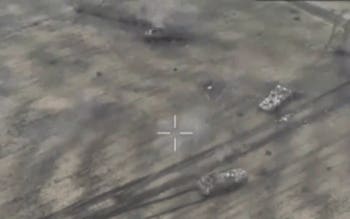In western Russia’s Kursk Oblast, a trio of Ukraine’s heaviest brigades is in a close fight with Russian marines and North Korean soldiers attacking from two directions. It’s an apocalyptic fight that’s costing the Russians—and possibly the North Koreans, as well—potentially dozens of vehicles and hundreds of lives.
That doesn’t mean the Russians won’t win. The Kremlin has built a manpower machine to pump replacement troops into the fight. The machine can’t function forever, of course. But there’s no sign it’ll run out of raw material any time soon. “On the Kursk direction, the enemy has regrouped,” the Ukrainian Center for Defense Strategies concluded.
On August 6, a powerful Ukrainian force—perhaps a dozen 400-person battalions from half a dozen brigades—burst through Russian defenses along the border in Kursk and quickly contested 400 square miles of the oblast.
Kyiv’s aim, it seems, was to grab a chunk of Russia in order to improve its position in any future armistice negotiations. Russian Pres. Vladimir Putin ordered his forces to recapture Kursk by Oct. 1—a deadline they obviously missed. But Russian counterattacks did chip away at the salient, gradually reducing Ukrainian control to around 270 square miles.
Now Putin wants the rest of Kursk back, and he’s clearly willing to trade thousands of Russian lives for it. His renewed sense of urgency may be related to Republican Donald Trump’s victory in the U.S. presidential election on Nov. 5. Trump has vowed to end the war in Ukraine before his January inauguration.
Trump’s long-shot proposal, which currently lacks a realistic enforcement mechanism, would freeze the front line at its current position. For Ukraine, that would mean losing 45,000 square miles of occupied territory.
For Russia, it would mean losing 270 square miles of Kursk. Unless, of course, those Russian marines—and their thousands of North Korean allies—can retake Kursk before a possible ceasefire.
The Russian effort is rushed and sloppy. Barreling toward Ukrainian positions in factory-fresh BTR-82 wheeled armored personnel carriers starting Nov. 7, Russians and allies from the 810th Naval Infantry Brigades have attacked the northern edge of the salient at the same time the 155th Naval Infantry Brigade—a unit that’s notorious for its war crimes—is attacking farther to the west.
Three heavily-armed Ukrainian formations—the 95th Air Assault Brigade, the 47th Mechanized Brigade with its American-made M-1 tanks and M-2 fighting vehicles and the recently reorganized 17th Heavy Mechanized Brigade—are blowing up infantry-laden BTRs nearly as fast as the 810th Naval Infantry Brigade can send them.
After a cursory survey of drone videos, open-source intelligence analysts have identified at least three BTR graveyards in and around the village of Pogrebki. Graphic footage depicts heaps of dead Russians.
But a few BTRs have managed to run the gauntlet of Ukrainian mines, drones, artillery and missiles to push back the front line more than a mile from its October position. And more Russians and allies are coming.
The allies aren’t just North Koreans. According to the Center for Defense Strategies, a Russian training facility in occupied Crimea is also funneling “mercenaries from African countries and Cuba” into the 810th Naval Infantry Brigade.
Read the full article here





